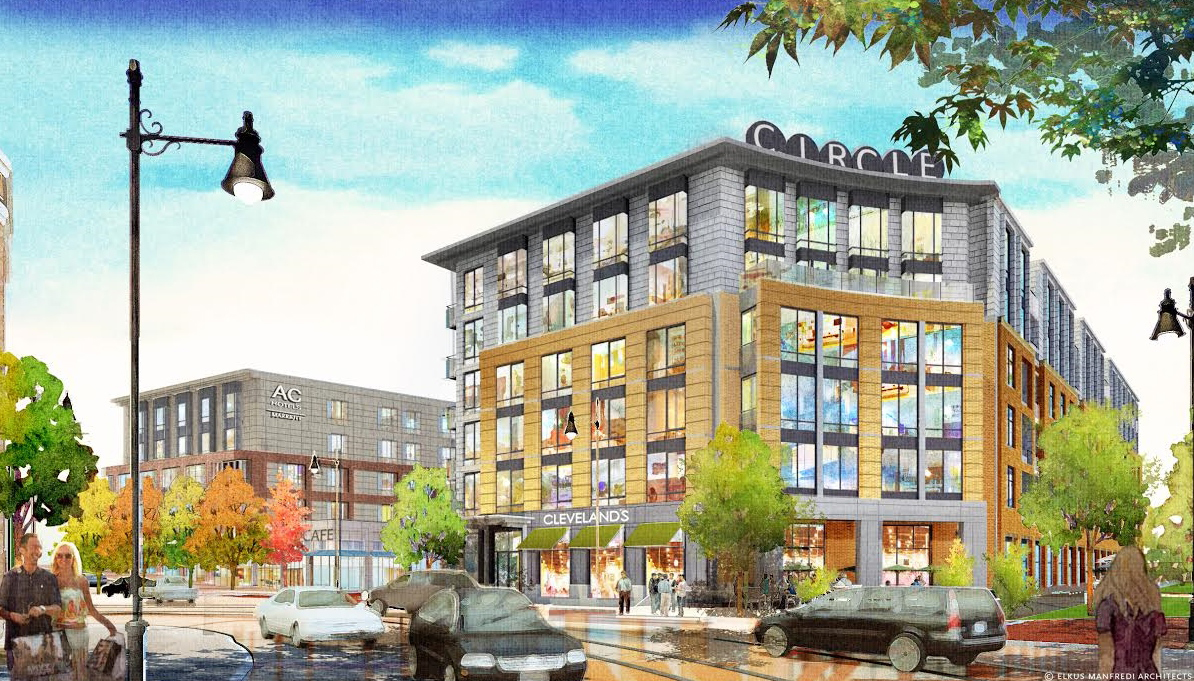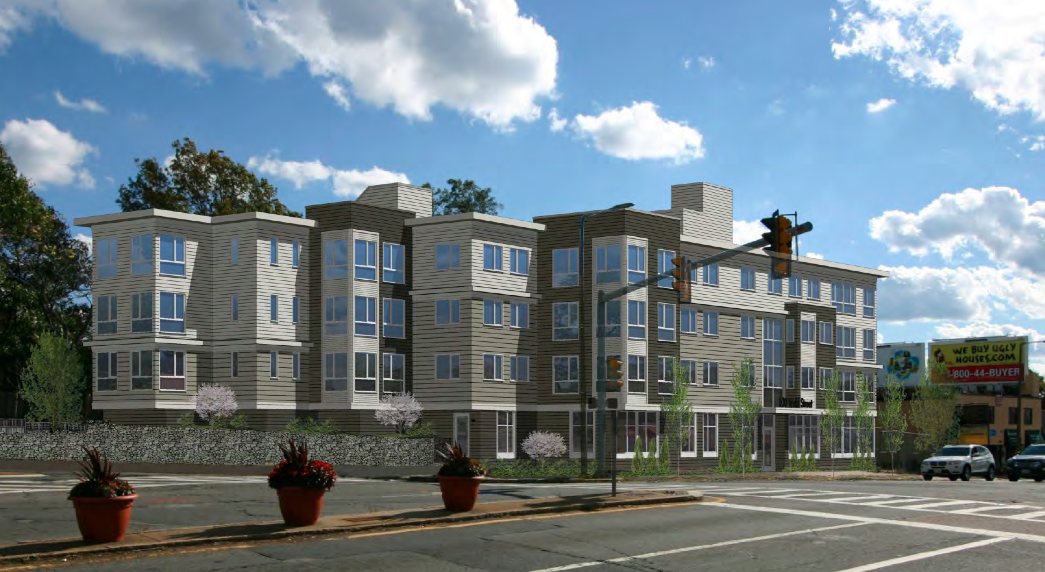GentriWatch: European Boutique Hotel for ‘Millennials’ Headed to Cleveland Circle
Welcome to GentriWatch, where we look for signs of gentrification happening around the city.

Rendering by Elkus Manfredi
WHEN YOU HEAR the word “Millennials,” what comes to mind? If you answered “European-style boutique hotel,” not only might you have a warped view of what a generation trembling beneath a mountain of college debt can afford, you can look forward to a promising career as a developer in Boston.
National Development, the same folks who brought you the Ink Block complex in the intensely gentrified South End, announced Tuesday that AC Hotels by Marriott will operate the planned 162-room “European-style boutique hotel” geared toward Generations X and Y on the former site of the Applebee’s and shuttered Cleveland Circle Cinema in Cleveland Circle.
The Boston Redevelopment Authority approved the $85 million collaboration between National Development and Boston Development Group in July. The project calls for 92 residential units, 14,000-square-feet of retail space, and 188 parking spaces.
The residential units will be age-restricted to those 60 and older, already drawing comparisons to National Development’s Waterstone at Wellesley independent living community. Curious, given the sheer volume of Boston College students in the area at any given time.
Construction in Cleveland Circle is expected to begin early next year, with an anticipated 2017 completion.
This is National Development’s second joint venture with the Marriott brand in Boston. In August, the BRA approved plans for a 200-room boutique hotel at the Ink Block, described as “design-led, urban, cosmopolitan and tailor-made for modern travelers looking for a new way of experiencing and feeling the city,” complete with a “European-inspired style that defines contemporary hospitality.”
Does Roggie’s count for European-inspired style?
• • •
FORMER STATE SENATOR Dianne Wilkerson penned the first piece in a series for DigBoston and the Boston Institute for Nonprofit Journalism, exquisitely titled, “How to Spend $1 Billion in Roxbury (Without Spending a Dime on Roxbury).” In it, Wilkerson wonders how a community development corporation in Roxbury, Dorchester, or Mattapan be representative of those it serves in any meaningful sense when black and Latino-owned businesses are glaringly left out:
This is an outrage! Those responsible for funding economic development have for the past quarter-century focused nearly all of their budgets on Roxbury, Dorchester, and Mattapan, and on subsidized housing for low-income people who are required to be poor in order to qualify for housing, and who must stay poor in order to maintain those arrangements. Not only does this process fail to satisfy the statute requiring that CDCs expand economic opportunities, but it fuels the kind of socioeconomic disasters and multi-generational poverty we all decried after reading recent reports by the Federal Reserve, the Brookings Institute, and the Boston Foundation. All these reports paint a dire, shameful, and dangerous picture of the economic reality facing more and more Black and Latino residents of Roxbury, Dorchester, and Mattapan.
Wilkerson focuses on two Roxbury development projects, Whittier Choice and Madison Park (both previously covered in GentriWatch), and suspects that “nearly all of the contracts for both projects will go to white-owned businesses.”
You can read Wilkerson’s column here.
• • •

Rendering via Boston Redevelopment Authority
THE BRA’S BOARD of directors approved Braintree-based Horizon Development’s $6.2 million plans for 16 condominiums at 100 Weld Street, where a long-vacant gas station now stands on the Roslindale-West Roxbury line. The four-story residential building, previously covered in GentriWatch, would include 25 on-site parking spaces.
Because Horizon did not require zoning relief, none of the 16 condos at 100 Weld Street will be made affordable.
• • •
AT THE SAME MEETING Wednesday night, the BRA approved plans for the Bartlett Square II project near on Armory Street in Jamaica Plain. Led by the same development team behind the condos at Bartlett Square I, which opened in 2012, the four-story, $3.5 million sequel will consist of three three-bedroom apartments, nine two-bedroom units, and three one-bedroom units, in addition to 5,700 square feet of retail space and a solar array on the roof. There will parking for 10 vehicles.
Two of Bartlett Square II’s 15 units will be made affordable for households earning 70 percent of area median income or below (or less than $48,250 for a one-person household).
Construction is expected to begin by March 2016, with an anticipated July 2017 completion.
• • •
TIM LOGAN at the Globe is an indispensable read for development news in Boston, as evidenced by his story Friday on a recent Boston Foundation study placing blame for the city’s stubbornly skyrocketing housing costs on the equally prohibitive cost of building here. Land, labor, and materials have all contributed to a 13-percent rise in building costs for developers over the last decade.
“You’re just out of the ballpark for any working family,” Barry Bluestone, co-author of the Boston Foundation report and head of Northeastern University’s Dukakis Center for Urban and Regional Policy, told Logan. “The cost is so high that the only construction developers can put up and not lose their shirt is either high luxury or heavily subsidized for the very poor.”
If this trend continues unchecked, the Boston Foundation projects that Boston will be left to the inordinately wealthy and the destitute, with our middle class all but vanished.
Notice something changing in your neighborhood? Let me know: kclauss@bostonmagazine.com, @KyleClauss.


